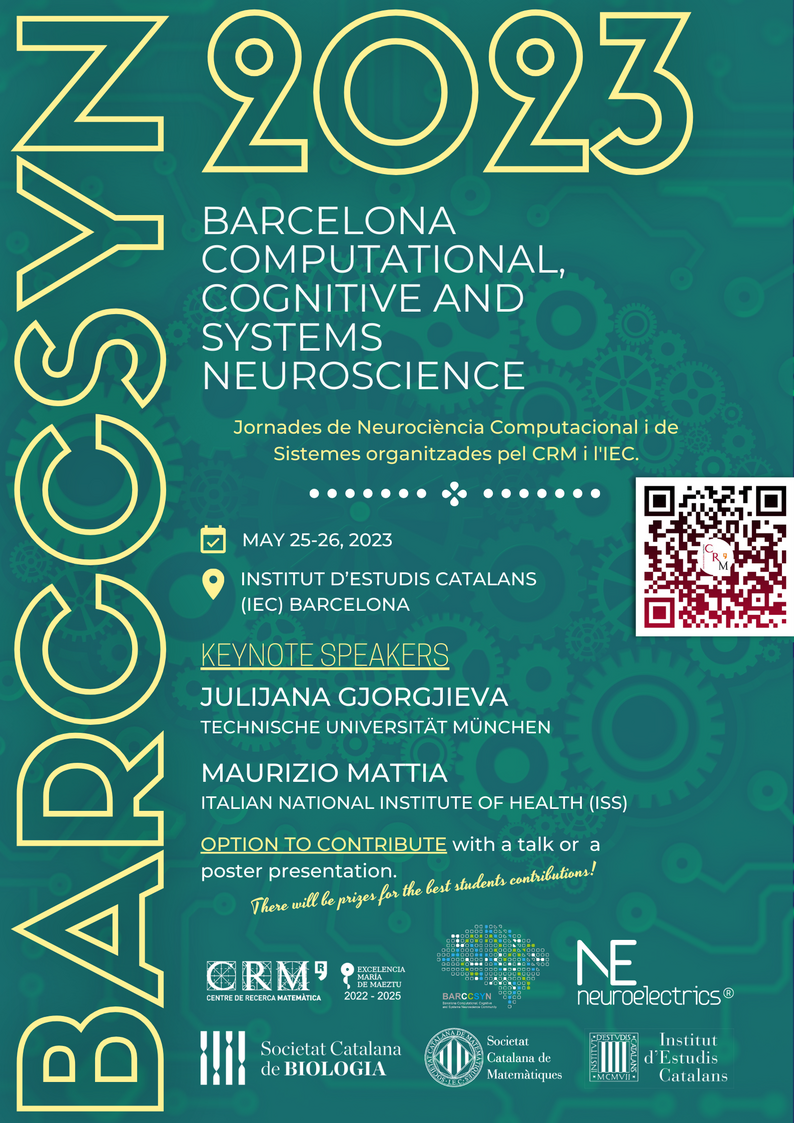Barccsyn 2023
Sign into May 26, 2023
Sala Prat de la Riba, Institut d’Estudis Catalans (IEC)
Carrer del Carme, 47, 08001 Barcelona
Institut d'Estudis Catalans
SCHEDULE
PHOTO GALLERY
POSTER SESSION 1
POSTER SESSION 2
information

BARCCSYN PAST EDITIONS
organizers
Keynote speakers
Emergence of organization and computation in neural circuits across scales

Julijana Gjorgjieva
Technische Universität München
Professor Gjorgjieva conducts research in the fields of computational and theoretical neuroscience. She is interested in how brain circuits become tuned to maintain a balance between constant change as we learn new things, and robustness to produce reliable behavior. In particular, she concentrates on two aspects of neural circuit organization, looking at how it emerges from the interaction of neuronal and synaptic properties during development, and from optimality and energy conservation principles that operate over the longer timescales of evolution.
Professor Gjorgjieva studied mathematics at Harvey Mudd College in California, USA. After obtaining a PhD in Applied Mathematics at the University of Cambridge in 2011, she spent five years in the USA as a postdoctoral research fellow at Harvard University and Brandeis University, supported by grants from the Swartz Foundation and the Burroughs-Wellcome Fund. In 2016, she set up an independent research group at the Max Planck Institute for Brain Research in Frankfurt and joined TUM as an assistant professor shortly after as part of the MaxPlanck@TUM program. She received tenure and joined TUM as a full professor in 2022. She is also a member of the Bernstein Center for Computational Neuroscience in Munich.
ABSTRACT
Many nervous systems develop and form functional circuits through a long period of development involving a myriad of mechanisms. Some of these are determined by genes and molecules, while others depend on neural activity patterns. I will present how these diverse mechanisms work together to set up neural circuits shortly after an animal is born, enabling it to gradually acquire its cognitive and behavioral capabilities. I will focus on the visual system, and demonstrate how neural circuits became established and capable of performing different computations. I will focus on some specific mechanisms such as inhibitory synaptic plasticity and the emergence of excitatory and inhibitory balance, and its role in the detection of novel stimuli.
Planning and serial reasoning in premotor cortex

Maurizio Mattia
Italian National Institute of Health (ISS)
Professor Mattia is a physicist with a PhD in Neurophysiology, holding a permanent Researcher position at the National Centre for Radiation Protection and Computational Physics of the Istituto Superiore di Sanità (Italian Institute of Health, Rome). His main interest is in bridging the gap between theory and experimental evidence on cortical network dynamics, by developing innovative data analyses and computational approaches.
ABSTRACT
Planning is the cognitive function underlying our ability to organize, for example, the motor output needed to achieve a future goal such as making a sandwich. The premotor cortex (PMC) with its integrative features is a key component of the brain network underpinning this function. Indeed, PMC has an active role in sensory-motor associations and in the compositional computation giving rise to a goal-directed sequence of actions.
Here I will discuss how the collective dynamics of PMC in monkeys unfolds to encode the plan to move and how unpredictable events leading to stop movement initiation are processed. I will focus on the mechanistic underpinnings responsible for the metastable dynamics resulting from the coordinated activity of heterogeneous cell assemblies.
Starting from the capability of PMC to process multiple competing sensory information and transform them into appropriate motor decisions, I will speculate on the possible role of this area in serial reasoning. Indeed, ordering arbitrary stimuli and actions as a sequence is a critical computational skill for planning. Thinking for instance to the aforementioned sandwich, after having taken the bread and cut it, it must eventually be stuffed before it is ready to be eaten.
To this purpose I will refer to the transitive inference task, where a subject knowing that A > B and B > C must infer that the item A has a higher rank than C (A > C). Finally, I will provide evidence that PMC is directly involved in solving this task by showing a neuronal correlate of the mental line in which the presented items are ordered. This in agreement with a theoretical expectation that the mental line results from a simple geometric computation.
List of participants
| Name | Institution |
|---|---|
| Manel Vila-Vidal | |
| Maurizio Mattia | Italian National Institute of Health (ISS) |
| Andriana Karuk | FIDMAG |
| Gianni Valerio Vinci | Istituto Superiore di Sanità |
| Mohamed AIT TAKNIOUINE | ENSEA |
| Arnau Busquets Garcia | Institut Hospital del Mar d'Investigacions Mèdiques |
| Júlia Pinho | Institut Hospital del Mar d'Investigacions Mèdiques |
| Manuel Molano-Mazón | UPC |
| Manuel Valero García | Institut Hospital del Mar d'Investigacions Mèdiques (IMIM) |
| Estefanía Moreno | Universitat de Barcelona |
| Jordi Abante Llenas | Universitat de Barcelona |
| Vicent Navarro Arroyo | Universitat de Barcelona |
| Akke Mats Houben | Universitat de Barcelona |
| Khashayar Baghizadeh Hosseini | Universitat de Barcelona |
| Joan Gort | Universitat Autònoma de Barcelona |
| Sundus Zafar | Universitat Autònoma de Barcelona |
| Alexis Pérez-Bellido | Universitat Autònoma de Barcelona |
| Marina Vegué | Universitat Politècnica de Catalunya |
| Pau Clusella | Universitat Politècnica de Catalunya |
| Antoni Guillamon Grabolosa | Universitat Politècnica de Catalunya |
| Gemma Huguet Casades | Universitat Politècnica de Catalunya |
| Alexandra Lillo Escuder | Universitat Politècnica de Catalunya |
| Joan Mora Juvanteny | Universitat Politècnica de Catalunya |
| Ferran Craven-Bartle Corominas | Universitat Politècnica de Catalunya |
| Carlota Pagès Portabella | Universitat Politècnica de Catalunya |
| Raul Adell Segarra | Universitat Politècnica de Catalunya |
| Brian Nicolas Medina Leandro | Universitat Politècnica de Catalunya |
| Adrián Ponce Alvarez | Universitat Politècnica de Catalunya |
| Marc Grau Leguia | Universitat Pompeu Fabra |
| Julian Schulte | Universitat Pompeu Fabra |
| Michael DePass | Universitat Pompeu Fabra |
| David Blair | Universitat Pompeu Fabra |
| Irene Acero Pousa | Universitat Pompeu Fabra |
| Sebastian Geli | Universitat Pompeu Fabra |
| fatmaalzahraa aboalasaad | Universitat Pompeu Fabra |
| Jakub Vohryzek | Universitat Pompeu Fabra |
| Anaïs Espinoso | Universitat Pompeu Fabra |
| Bastian Pietras | Universitat Pompeu Fabra |
| Yonatan Sanz Perl | Universitat Pompeu Fabra |
| Karla Ivankovic | Universitat Pompeu Fabra |
| Pau Pomés | Universitat Pompeu Fabra |
| Karla Padilla | Universitat Pompeu Fabra |
| Jacopo Epifanio | Universitat Pompeu Fabra |
| Lou Zonca | Universitat Pompeu Fabra |
| Elvira del Agua Banyeres | Universitat Pompeu Fabra |
| Chiara Mastrogiuseppe | Universitat Pompeu Fabra |
| Demetrio Ferro | Universitat Pompeu Fabra |
| Francesco Damiani | Universitat Pompeu Fabra |
| Jorge Ramirez Ruiz | Universitat Pompeu Fabra |
| Eider Lumi Pérez-Ordoyo Bellido | Universitat Pompeu Fabra |
| Gorka Zamora-López | Universitat Pompeu Fabra |
| Paulina Clara Dagnino | Universitat Pompeu Fabra |
| Ludovica Mana | Universitat Pompeu Fabra |
| Marian Martínez Marín | Universitat Pompeu Fabra |
| Justo Montoya | Universitat Pompeu Fabra |
| Marc Schwartz Palleja | Universitat Pompeu Fabra |
| Dmytro Grytskyy | Universitat Pompeu Fabra |
| Alice Vidal | Universitat Pompeu Fabra |
| Elvira García Guzmán | Universitat Pompeu Fabra |
| Rubén Moreno Bote | Universitat Pompeu Fabra |
| Wiep Stikvoort | Universitat Pompeu Fabra |
| Ernest Montbrió | Universitat Pompeu Fabra |
| Gustavo Patow | Universitat de Girona |
| Melina Timplalexi | Universitat Internacional de Catalunya |
| Pedro Mateos-Aparicio | Universitat Internacional de Catalunya |
| Adam Ranson | Universitat Internacional de Catalunya |
| Joan Salvador Ardid Ramírez | Universitat Politècnica de València |
| Silvia Vilariño León | Universitat Politècnica de València |
| Benjamín Pascual Estrugo | Universitat Politècnica de València |
| Abdul Parveen Lubna Shaheen | Universitat Jaume I de Castelló |
| Raphael Kaplan | Universitat Jaume I de Castelló |
| marina martinez-garcia | Universitat Jaume I de Castelló |
| Marta Rodriguez | Universitat Jaume I de Castelló |
| Patrick McAndrew | National University of Ireland |
| Juan Manuel Monti | National University of Rosario |
| Julijana Gjorgjieva | Technical University of Munich |
| Cornelius Bergmann | University of Bonn |
| Silvia Daun | University of Cologne |
| René Skukies | University of Stuttgart |
| Sofia Raglio | Sapienza University of Rome |
| Daniele De Pasquale | University of Bologna |
| Gabriele Di Antonio | Roma Tre University |
| Isabel Maria Cornacchia | University of Edinburgh |
| Neus Pou Amengual | Centre de Recerca Matemàtica |
| Alexandre Garcia-Duran | Centre de Recerca Matemàtica |
| Alex Roxin | Centre de Recerca Matemàtica |
| Pan Ye Li | Centre de Recerca Matemàtica |
| Gloria Cecchini | Centre de Recerca Matemàtica |
| Klaus Wimmer | Centre de Recerca Matemàtica |
| Citlalli Vivar | Centre de Recerca Matemàtica |
| Miguel Donderis | Centre de Recerca Matemàtica |
| Anna Wilson Ganzabal | Centre de Recerca Matemàtica |
| Sara Ibañez | Centre de Recerca Matemàtica |
| Lucía Arancibia | Centre de Recerca Matemàtica |
| Nicolás Pollan Hauer | Centre de Recerca Matemàtica |
| Jaime de la Rocha | IDIBAPS |
| Melanie Tschiersch | IDIBAPS |
| Balma Serrano Porcar | IDIBAPS |
| Alexis Cerván | IDIBAPS |
| Albert Compte | IDIBAPS |
| carles sindreu | IDIBAPS |
| Alexandre Mahrach | IDIBAPS |
Poster and contributed talks
-
- Deadline: 25/04/2023
- Resolutions will be sent before 05/05/2023
To apply, please, finalise the registration procedure and then submit the abstract of your talk using the form below:
CONTRIBUTIONS FORM
PRIZES
There will be prizes for the best students contributions
registration
You will be asked to create a CRM web user account before registering to the activity through the following link (please note that it will be necessary to fill in both the personal and academic requested information in the web user intranet):
CRM USER CREATION
Once you have created your CRM user, you can sign in on the activity web page to complete your registration or click on the following link.
REGISTER
INVOICE/PAYMENT INFORMATION
IF YOUR INSTITUTION COVERS YOUR REGISTRATION FEE: Please note that, in case your institution is paying for the registration via bank transfer, you will have to indicate your institution details and choose “Transfer” as the payment method at the end of the process.
UPF | UB | UPC | UAB
*If the paying institution is the UPF / UB/ UPC / UAB, after registering, please send an email to comptabilitat@crm.cat with your name and the institution internal reference number that we will need to issue the electronic invoice. Please, send us the Project code covering the registration if needed.
IDIBAPS
*If the paying institution is IDIBAPS, please send an email to comptabilitat@crm.cat with the Project reference code that will cover the registration cost, to be added to the invoice if necessary.
Paying by credit card
IF YOU PAY VIA CREDIT CARD but you need to provide the invoice to your institution to be reimbursed, please note that we will also need you to send an email to comptabilitat@crm.cat providing the internal reference number given by your institution and the code of the Project covering the registration (if necessary).
LODGING INFORMATION
ON-CAMPUS AND BELLATERRA
BARCELONA AND OFF-CAMPUS
|
For inquiries about this event please contact the Scientific Events Coordinator Ms. Núria Hernández at nhernandez@crm.cat
|







